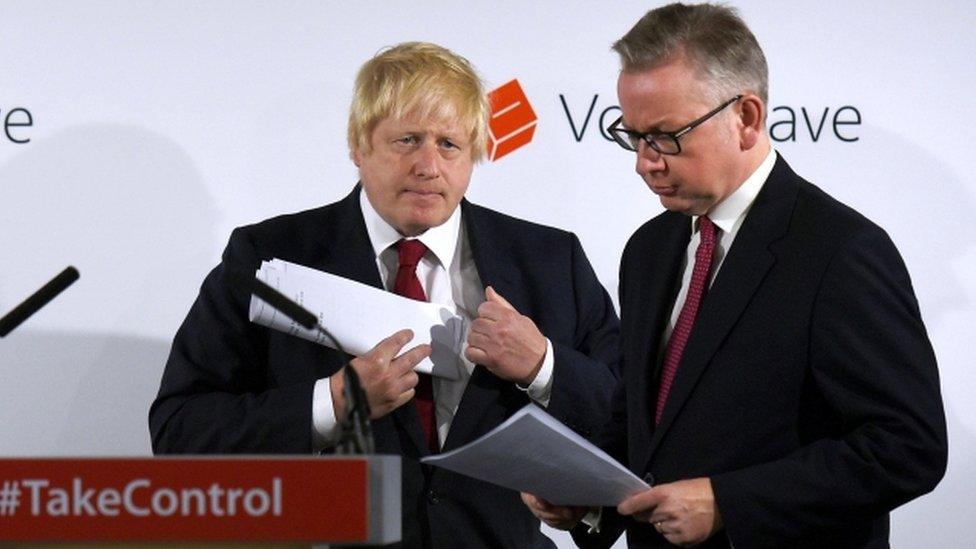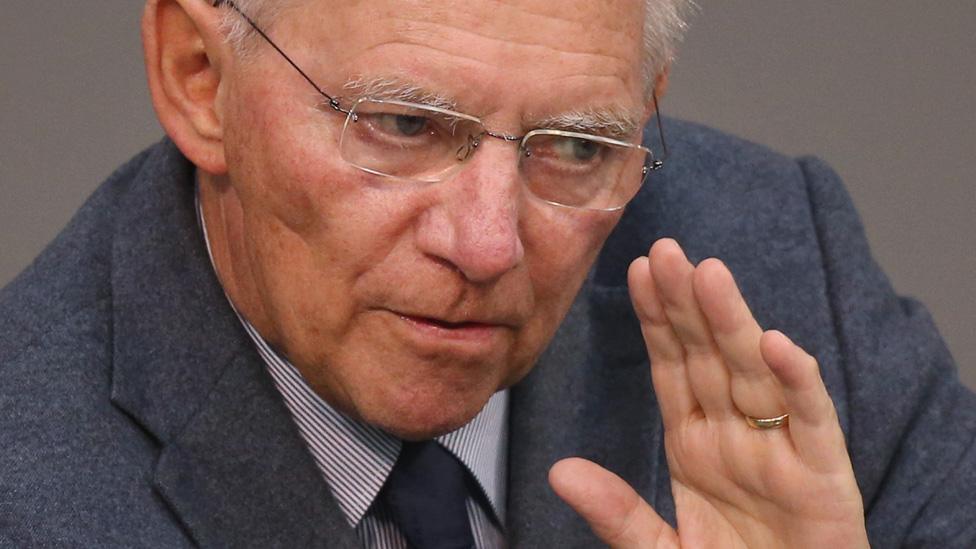Brexit: There is a vacuum that must be filled
- Published

Boris Johnson and Michael Gove: Where next?
The country is gripped by a strange mood - it is as if certainty, the recognisable shape of things, has been taken away.
The UK voted decisively but with little idea as to what would follow a vote to leave the EU.
There is no route map or agreed strategy or list of demands. Everything has to be drawn up.
A group of individuals fought a highly effective campaign and won.
When asked what would happen after a vote to leave, they never gave a comprehensive answer.
They were a movement, not a party, and had no detailed manifesto.
Neither do they have any power.
All they have is the authority of 17 million votes behind them.
EU referendum: All you need to know
Six key questions after Britain's vote to exit the EU
Some believe that victory has brought a dangerous vacuum.
Alistair Darling says he is more worried now than he was as chancellor in the 2008 banking crisis
The former Chancellor Alistair Darling - a prominent figure in the Remain campaign - says: "We've got no government, no opposition. The people who got us into this mess have run away."
The EU Commission and the party leaders in the European Parliament want the UK to trigger Article 50 straight away and to begin the process of withdrawal immediately.
The President of the European Commission, Jean-Claude Juncker, has called on the UK to "clarify its position."
The officials in Brussels say any delay would only deepen uncertainty.
No-one in Britain, however, seems inclined to move quickly and for a very good reason.
They would be sitting at the negotiating table with a clean sheet of paper and a two-year clock would have started ticking.
Prime Minister David Cameron has made clear there will be no official move to withdraw until a new government is in place.
Even then, there will need to be a huge debate as to what the UK is seeking. Many will want to be part of that.
During the referendum campaign, there were differences within the Leave camp.
Some thought that staying in the single market was essential; others preferred a UK-EU free trade deal outside the single market.
But it was never clear which trading model they favoured.
Some floated the idea of the Canadian trade agreement, while others wanted the UK to operate under the European Economic Area (EEA).
And some claims made during the heat of the campaign have now been dropped or re-explained.
There was tense exchange between the BBC's Newsnight programme's Evan Davis and Leave campaigner Daniel Hannan MEP over free movement
Prominent Leave campaigner Daniel Hannan is now talking about "staying within a common market but outside the political integration", external, but he accepts that might mean agreeing to freedom of labour.
That has surprised some in the Leave campaign who had argued that migration could only be controlled if freedom of movement was curtailed.
For some, the priority is regaining sovereignty; for others, it is reducing or controlling migration.
So decisions on what the UK wants will be left to the next government, which will not be in place until September at the earliest.
In the meantime, the civil service will start doing preliminary work.
When it was put to Liam Fox, another prominent Leave campaigner, that there had been no planning for an exit, he said: "The idea that there was no contingency planning is preposterous.
"That would have been utterly irresponsible".
There is a nervousness that everything will have to be built from the ground up.
So what will the UK seek?
Boris Johnson wrote on Monday, external: "There will continue to be free trade and access to the single market."
This statement was almost immediately disputed.
The Foreign Secretary, Philip Hammond, said it was not possible to control migration and at the same time have access to the single market.
But he German Finance Minister, Wolfgang Schaeuble, has spoken of "associate membership."
And others are suggesting that the UK retain full access to the single market including payments into the EU budget but with a compromise on freedom of movement.

German Finance Minister Wolfgang Schaeuble has raised the possibility of associate membership
What makes the drawing up of a strategy more difficult is that the political establishment in London is firmly in favour of remaining in the EU as are two-thirds of MPs.
They are in no hurry to move towards withdrawal.
Indeed, in this fevered political atmosphere, many are saying that any new deal with Brussels would have to be put to the British voters.
For the moment, EU leaders have shut the door on informal negotiations precisely because it would send out the signal that a country could vote to leave and then trigger a renegotiation.
In the short-term, the point-blank refusal to have informal talks is to be expected - but it might not be a final position.
Agreeing what the UK wants will not be easy.
For many, the priority is to retain full access to the single market, including financial services.
In exchange, London might accept freedom of movement but only if there were further concessions, perhaps an emergency brake when the pressures from immigration are too high, which was originally on David Cameron's agenda.
But many in the Leave campaign want to repeal the European Communities Act, external that establishes the supremacy of EU law; they want no payments into the EU budget and no element of freedom of movement.
Health Secretary Jeremy Hunt: 'UK needs say on EU departure terms'
Health Secretary Jeremy Hunt has pointed out that the public did not vote on the conditions for a EU departure.
He makes the case that when that deal is done, it could be put to the electorate.
The EU has a history of second votes.
Would it be tempted to make a further compromise if it could keep the union together?
Almost everyone at Westminster, and among those who voted to remain in the EU, says the will of the people cannot be overruled or sidestepped.
Only a further vote or a general election could change that.
The UK and Europe's leaders will have to live with uncertainty for several months.
For the UK does not yet have a plan, and that opens the door for a period of intense politics.